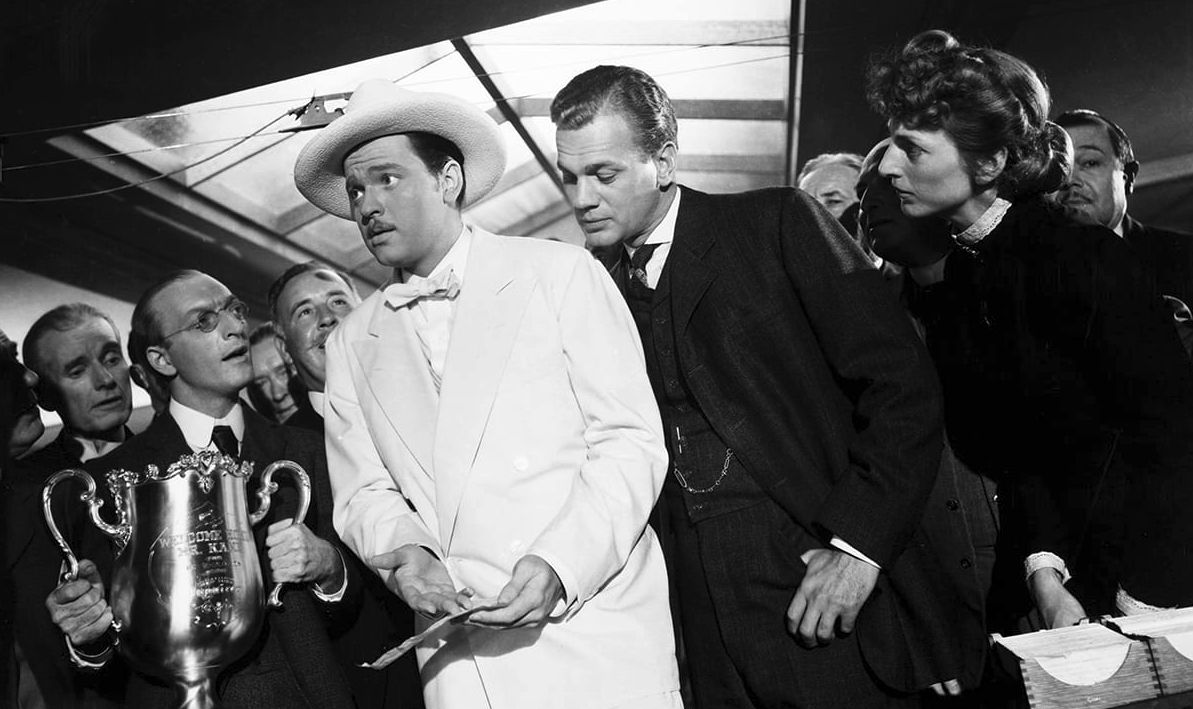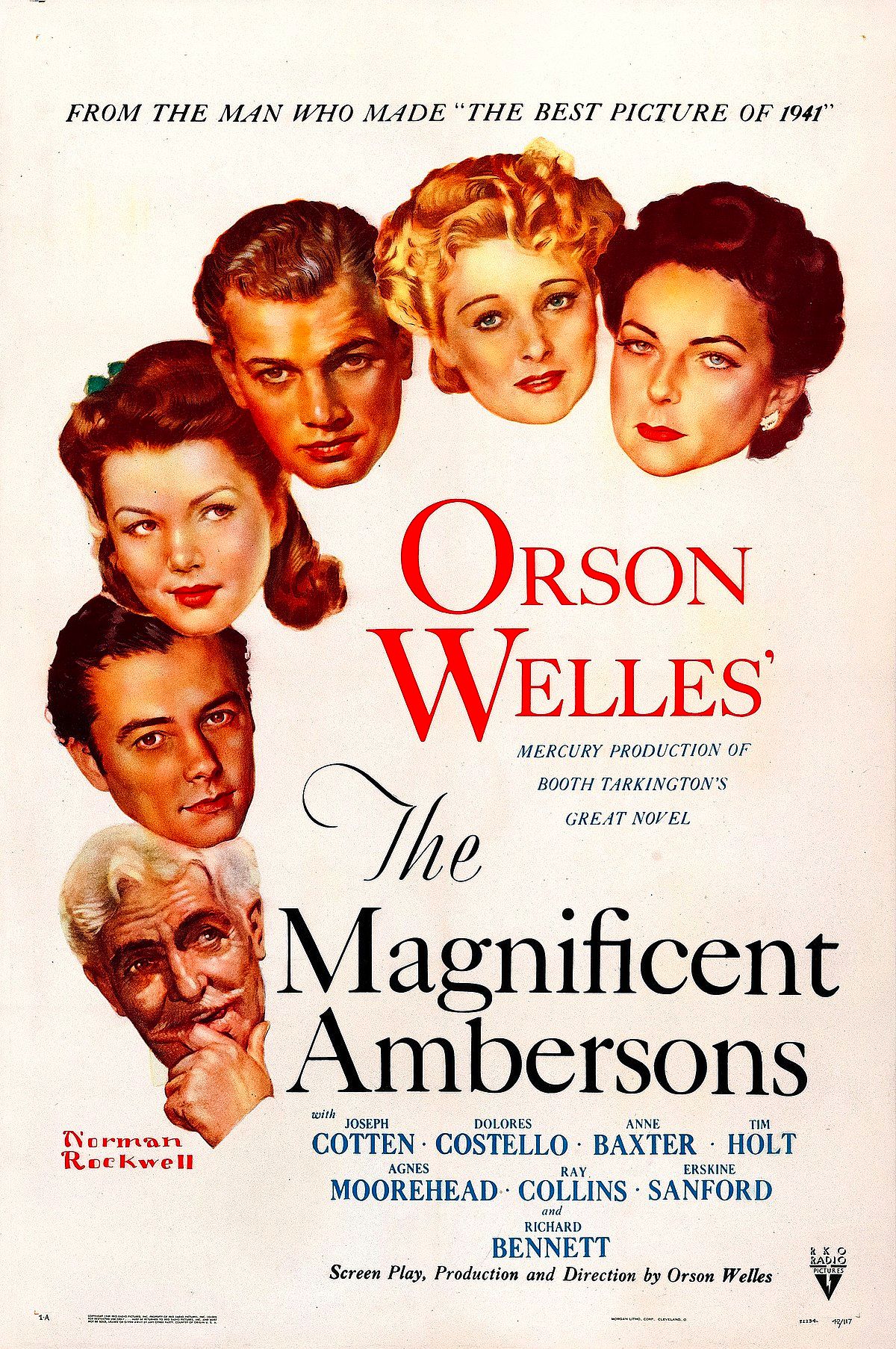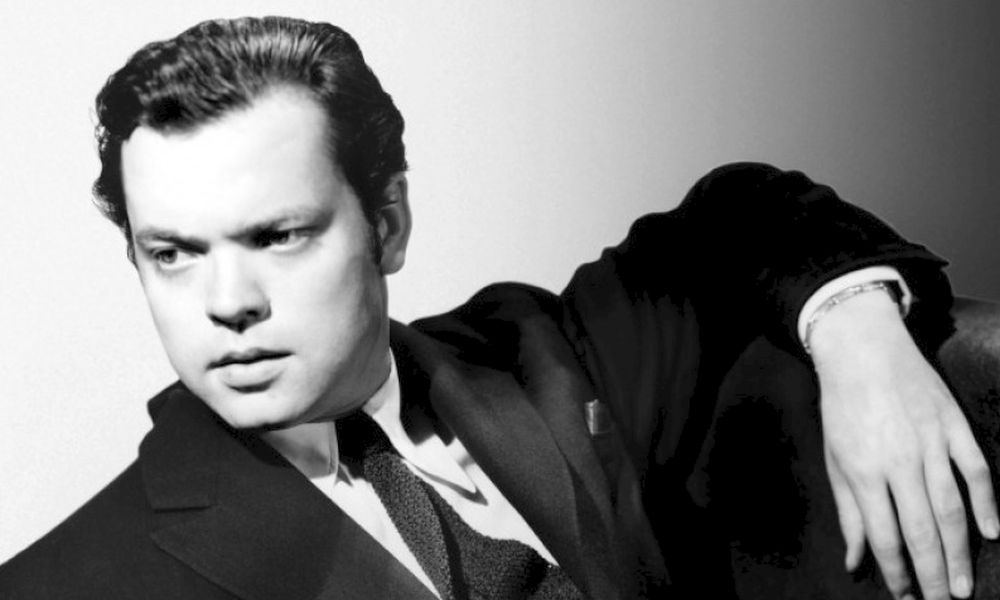"The Wellesian cinema is the cinema of magic and marvels, and everything, and especially its prime protagonist, is larger than life. The dramatic conflict in a Welles film often arises from the dialectical collision between morality and megalomania, and Welles more often than not plays the megalomaniacal villain without stilling the calls of conscience." - Andrew Sarris (The American Cinema, 1968)
Orson Welles
Director / Actor / Screenwriter / Producer
(1915-1985) Born May 6, Kenosha, Wisconsin, USA
Top 250 Directors / 50 Key Noir Directors
(1915-1985) Born May 6, Kenosha, Wisconsin, USA
Top 250 Directors / 50 Key Noir Directors
Key Production Countries: USA, France, Spain, Italy, West Germany
Key Genres: Drama, Period Film, Film Noir, Psychological Thriller, Documentary, Thriller, Tragedy, Mystery, Short Film
Key Collaborators: Joseph Cotten (Leading Character Actor), Erskine Sanford (Character Actor), Jeanne Moreau (Leading Actress), Russell Metty (Cinematographer), Akim Tamiroff (Leading Character Actor), Ray Collins (Leading Character Actor), Angelo Francesco Lavagnino (Composer), Everett Sloane (Leading Actor), Gary Graver (Cinematographer), Edmond Richard (Cinematographer), Robert Wise (Editor), Renzo Lucidi (Editor)
Key Genres: Drama, Period Film, Film Noir, Psychological Thriller, Documentary, Thriller, Tragedy, Mystery, Short Film
Key Collaborators: Joseph Cotten (Leading Character Actor), Erskine Sanford (Character Actor), Jeanne Moreau (Leading Actress), Russell Metty (Cinematographer), Akim Tamiroff (Leading Character Actor), Ray Collins (Leading Character Actor), Angelo Francesco Lavagnino (Composer), Everett Sloane (Leading Actor), Gary Graver (Cinematographer), Edmond Richard (Cinematographer), Robert Wise (Editor), Renzo Lucidi (Editor)
"If we have dwelt at some length on Orson Welles it is because the date of his appearance in the filmic firmament (1941) marks more or less the beginning of a new period and also because his case is the most spectacular and, by virtue of his very excesses, the most significant. Yet Citizen Kane is part of a general movement, of a vast stirring of the geological bed of cinema, confirming that everywhere up to a point there had been a revolution in the language of the screen." - André Bazin (What is Cinema? Volume 1, 1967)
"Like von Stroheim and von Sternberg, although otherwise hardly in similar mould, Wisconsin-born Welles was one of Hollywood's enfants terribles, beginning with brilliance but soon falling out with the studio, having his work hacked down and setting off on wanderings round the world, forever in search of another masterpiece and the money to make one." - David Quinlan (Quinlan's Film Directors, 1999)

Citizen Kane (1941)
"It is almost tragically ironic that George Orson Welles, without doubt one of the greatest filmmakers ever, was forced to work for most of his career under the most adverse of conditions. Such were his genius and ambition that his films, years ahead of their time, still astonish by their inventiveness, stylistic virtuosity and freshness; while the widely held view that he never fulfilled his early promise fails to take account of the thematic and moral consistency of his work, not to say its restless experimentalism." - Geoff Andrew (The Film Handbook, 1989)
"Welles’s outsider status in connection with the American film industry is an interesting part of cinema history in itself, but his importance as a director is due to the innovations he introduced through his films and the influence they have had on filmmaking and film theory. Considering the turbulent relationship Welles experienced with Hollywood and the circumstances under which his films were made in Europe, it is surprising there is any thematic and stylistic consistency in his work at all." - Susan Doll (International Dictionary of Films and Filmmakers, 2000)
"One of the most important filmmakers to emerge since the advent of the talkie. Welles was one of the first in Hollywood to realize the potential of elliptical narratives and deep focus in the construction of camera angles. His oeuvre consists of complex tales with themes of truth and illusion (Citizen Kane, 41; The Magnificent Ambersons, 42; Touch of Evil, 58; Chimes at Midnight, 66). Welles is also one of the few commercial filmmakers to experiment with the soundtrack of a film." - William R. Meyer (The Film Buff's Catalog, 1978)
“I started at the top,” Orson Welles said, “and worked down.” For his first film, he was swept into Hollywood on a wave of success that had been rising since his childhood. Studio doors and coffers stood open to him. But for his last film, unfinished when he died, he had to beg, borrow, and sell himself.” - Dian G. Smith (Great American Film Directors, 1987)
"People should cross themselves when they say his name." - Marlene Dietrich
"I want to give the audience a hint of a scene. No more than that. Give them too much and they won't contribute anything themselves. Give them just a suggestion and you get them working with you. That's what gives the theater meaning: when it becomes a social act." - Orson Welles
"Hollywood is the only industry, even taking in soup companies, which does not have laboratories for the purpose of experimentation." - Orson Welles
Selected Filmography
{{row.titlelong}}
GF Greatest Films ranking (★ Top 1000 ● Top 2500)
21C 21st Century ranking (☆ Top 1000)
T TSPDT N 1,000 Noir Films
R Jonathan Rosenbaum S Martin Scorsese
21C 21st Century ranking (☆ Top 1000)
T TSPDT N 1,000 Noir Films
R Jonathan Rosenbaum S Martin Scorsese
Orson Welles / Favourite Films
The Baker's Wife (1938) Marcel Pagnol, Battleship Potemkin (1925) Sergei Eisenstein, The Best Years of Our Lives (1946) William Wyler, Bicycle Thieves (1948) Vittorio De Sica, City Lights (1931) Charles Chaplin, La Grande illusion (1937) Jean Renoir, Greed (1924) Erich von Stroheim, Intolerance (1916) D.W. Griffith, Nanook of the North (1922) Robert J. Flaherty, Ninotchka (1939) Ernst Lubitsch, Shoeshine (1946) Vittorio De Sica, Stagecoach (1939) John Ford.
Source: Cinematheque Belgique (1952)
The Baker's Wife (1938) Marcel Pagnol, Battleship Potemkin (1925) Sergei Eisenstein, The Best Years of Our Lives (1946) William Wyler, Bicycle Thieves (1948) Vittorio De Sica, City Lights (1931) Charles Chaplin, La Grande illusion (1937) Jean Renoir, Greed (1924) Erich von Stroheim, Intolerance (1916) D.W. Griffith, Nanook of the North (1922) Robert J. Flaherty, Ninotchka (1939) Ernst Lubitsch, Shoeshine (1946) Vittorio De Sica, Stagecoach (1939) John Ford.
Source: Cinematheque Belgique (1952)
Orson Welles / Fan Club
Jonathan Rosenbaum, Martin Scorsese, Kenneth Turan, José Luis Guarner, Geoff Andrew, Derek Malcolm, Peter Bogdanovich, Roger Ebert, Joe Dante, Joseph McBride, Kent Jones, Jean-Pierre Berthomé.
Jonathan Rosenbaum, Martin Scorsese, Kenneth Turan, José Luis Guarner, Geoff Andrew, Derek Malcolm, Peter Bogdanovich, Roger Ebert, Joe Dante, Joseph McBride, Kent Jones, Jean-Pierre Berthomé.
"Fan Club"
These film critics/filmmakers have, on multiple occasions, selected this director’s work within film ballots/lists that they have submitted.
These film critics/filmmakers have, on multiple occasions, selected this director’s work within film ballots/lists that they have submitted.


